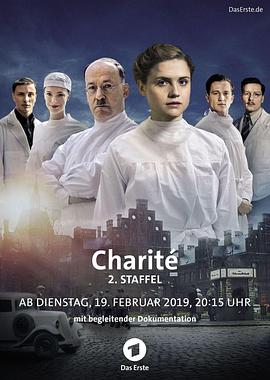甜蜜家园2
宋江,李阵郁,李施吟,高旻示,朴珪瑛,刘五性,吴正世,金武烈,郑振永

I cannot recommend this German TV series, now available on Netflix, strongly enough.
The two seasons of the show, six episodes each, depict the ups and downs of Charite, the biggest medical institution of Germany and workplace of many German Nobel Prize winners in medicine and physiology, before the turn of the twentieth century and towards the end of WWII. You will see how the doctors and researchers toiled themselves and risk their own health to seek a cure, sometimes to no avail, for infectious diseases that are easily prevented or cured nowadays. You will see how the most reputable doctors, while struggling for their own survival under the Nazi rule, strove to save their patients and protect the denounced, and worked to resist the dictatorship.
What I appreciate the most about this show is that it also puts the darker facets of the institution and those greatest medical professionals on display: from personal matters, such as opioid addiction and unapologetic infidelity, to grand social stigma, including pervasive, unconstrained antisemitism in the 1890s, the common, false belief in an Aryan race and in its superiority even among the educated elites, the frantic persecution of homosexuals in the Nazi era, and the unmasked bargaining and exchange of interests before the Third Reich's doomsday. Just as Anni Waldhausen, the heroine of the second season, points out, everyone was guilty. The Germans show tremendous courage in revisiting and exposing the ugly, brutal truths of history.
It was also those ugly truths that made the sparkles of humanity more cherishable. A nurse who initially thought of Indians as beasts attended to an Indian woman meticulously, despite the language barrier and the patient's visually unbearable symptoms, and finally understood the humanness of people that looked different. A psychiatry student, loyal to her Fascist supervisor and the idea of the "greater German race," through personal misfortunes and caring for her patients, came to the agonizing realization of the Nazis' atrocity and eventually supported the resistance.
What strikes me the most is one line towards at the end of the second season. When the Red Army marched into Berlin, a Russian doctor reunited with his professor at Charite back in the 1920s. When he asked Professor Sauerbruch what this place needed the most, the surgeon who had continued operations during the most intense air raids answered, "Sense."
Thank Charite for making the viewers contemplate "sense." We all can never get enough or too much of it. "<>""}
I cannot recommend this German TV series, now available on Netflix, strongly enough.
The two seasons of the show, six episodes each, depict the ups and downs of Charite, the biggest medical institution of Germany and workplace of many German Nobel Prize winners in medicine and physiology, before the turn of the twentieth century and towards the end of WWII. You will see how the doctors and researchers toiled themselves and risk their own health to seek a cure, sometimes to no avail, for infectious diseases that are easily prevented or cured nowadays. You will see how the most reputable doctors, while struggling for their own survival under the Nazi rule, strove to save their patients and protect the denounced, and worked to resist the dictatorship.
What I appreciate the most about this show is that it also puts the darker facets of the institution and those greatest medical professionals on display: from personal matters, such as opioid addiction and unapologetic infidelity, to grand social stigma, including pervasive, unconstrained antisemitism in the 1890s, the common, false belief in an Aryan race and in its superiority even among the educated elites, the frantic persecution of homosexuals in the Nazi era, and the unmasked bargaining and exchange of interests before the Third Reich's doomsday. Just as Anni Waldhausen, the heroine of the second season, points out, everyone was guilty. The Germans show tremendous courage in revisiting and exposing the ugly, brutal truths of history.
It was also those ugly truths that made the sparkles of humanity more cherishable. A nurse who initially thought of Indians as beasts attended to an Indian woman meticulously, despite the language barrier and the patient's visually unbearable symptoms, and finally understood the humanness of people that looked different. A psychiatry student, loyal to her Fascist supervisor and the idea of the "greater German race," through personal misfortunes and caring for her patients, came to the agonizing realization of the Nazis' atrocity and eventually supported the resistance.
What strikes me the most is one line towards at the end of the second season. When the Red Army marched into Berlin, a Russian doctor reunited with his professor at Charite back in the 1920s. When he asked Professor Sauerbruch what this place needed the most, the surgeon who had continued operations during the most intense air raids answered, "Sense."
Thank Charite for making the viewers contemplate "sense." We all can never get enough or too much of it. {else}时值1943年,柏林夏利特医院的工作人员努力应对二战和纳粹统治带来的影响,其中就包括优生医疗实践。{end if}收起